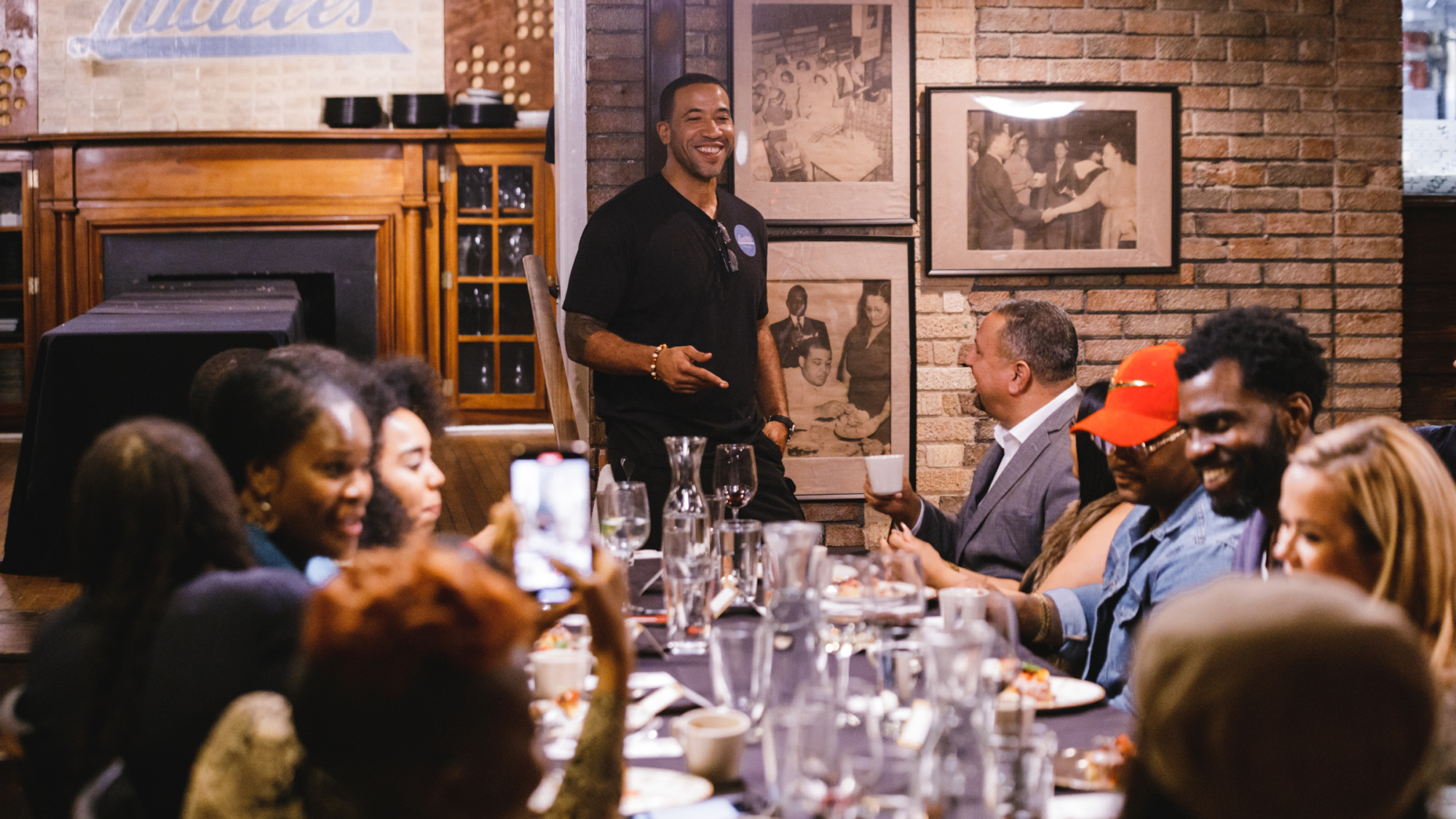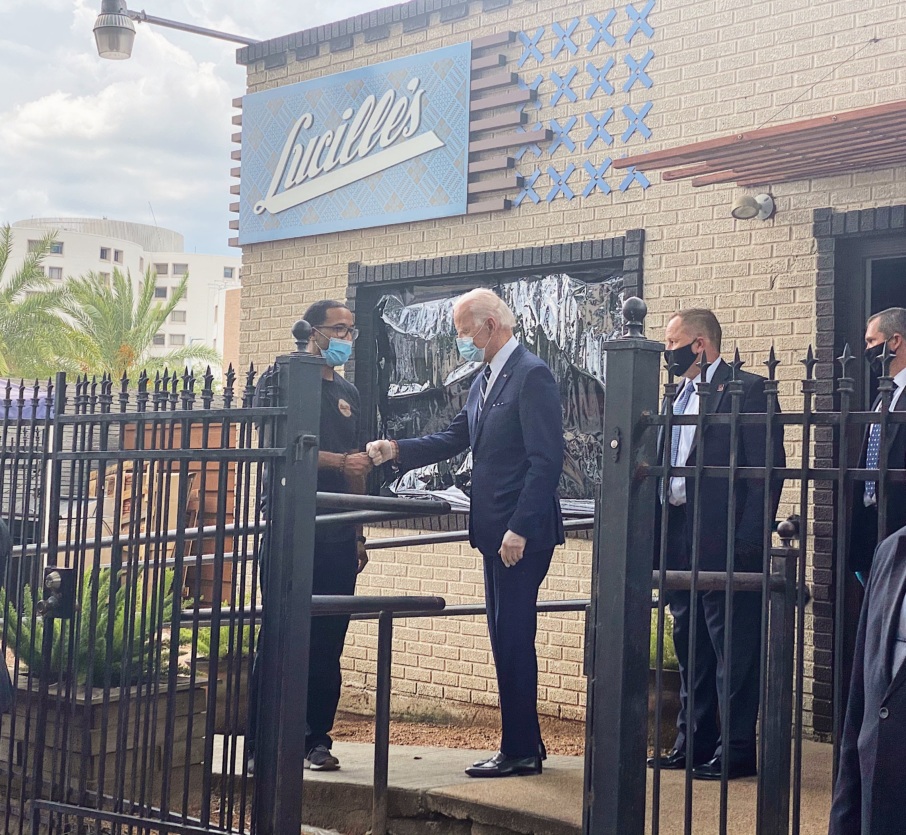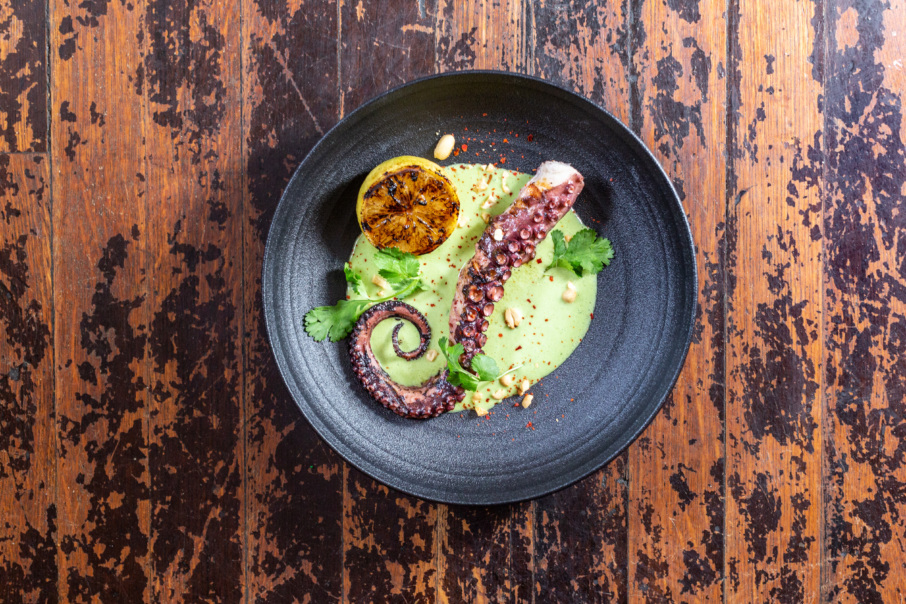Lucille’s
Museum District
Close

Chef-owner Chris Williams opened Lucille’s restaurant in Houston in 2012 with his brother, Ben.
The restaurant is named for his great-grandmother, Lucille Elizabeth Bishop Smith, an educator, chef, and successful food entrepreneur who invented the first hot-roll mix to be marketed in America.
Lucille’s has remained open throughout the pandemic, and recently reopened last month for dine-in service. His words follow.
*****
Earlier this month, the Biden campaign selected our restaurant to host a private meeting with George Floyd’s family on Monday, June 8 — the day before the funeral here in Houston. Former Vice President Biden wanted to express his condolences directly to the family, and have a conversation about how things could change.
It was somber. I personally didn’t know much about the Floyd family. I’d heard about George Floyd’s daughter who said “my daddy’s going to change the world.” It just made it that much more real to see them and meet them.
One of the staffers told me something that George Floyd’s son said. Biden said something to him about his dad changing the world, and he replied, “Honestly, I didn’t want my dad to change the world. I just want my dad.” That was really heartbreaking and humanizing.
By the end of it, they came downstairs, and we fed them, and they loved it. They were happy, and they were having a good time. It was really nice to see.
It’s a part of history, what’s happening right now. All of this is history. This pandemic. The George Floyd movement. The way we handle them will definitely be a part of our history.
We’re far from over on both accounts.

*****
If there’s one thing I want diners to understand, it’s how important it is for all of us to come together to support all independently owned restaurants, especially now.
What’s happening with people talking about supporting Black businesses, that’s dope. That’s great. It’s on time.
But what I don’t like is the “Ice Bucket Challenge” performative component of it. It makes it seem like you should go here, not because it’s exceptional or because it’s just a great restaurant, but because you should go support this “little-engine-that-could” kind of restaurant.
I mean, do I call a white-owned restaurant a white restaurant? Or just a restaurant? … It’s just a restaurant. That’s what I call Lucille’s: it’s a good restaurant that has earned your business off the merit of its work and its product.
My staff is everything — African American, Brazilian, Ghanian, Mexican, half-Mexican, Vietnamese, Ecuadorian, Venezuelan. They’re from Ukraine, Uzbekistan, Kazakhstan. They are from everywhere, and they have worked with me forever. There is very low turnover. The restaurant is a reflection of our life experiences.
Throughout the pandemic shutdown, I would go to an independently owned restaurant every single day that we were open — not just Black-owned — and that’s how I would feed my entire staff, every single day. I put $300 into a different restaurant every single day. There were some Black-owned restaurants, of course. But they were just restaurants, independently owned restaurants. That was the only criteria.
Did you get the PPP (Payment Protection Program) like Danny Meyer, or are you some big-ass company who took advantage of this shit? If you are, you won’t get my business. But if you’re like me, and you’re fighting for your business, you’re going to get my business.
That’s what I hate about the performative activism that’s happening right now. Don’t come to us now, when I needed you then.
The truth is that every restaurant is suffering now, and we all need each other; But I also don’t want people to forget that there are a bunch of minority-owned restaurants that have a harder time getting businesses started on their own and finding capital. That’s a real thing. Get behind that in order to make long-lasting change in this industry.

I also want people to know that Black food, Black restaurants, Black cooking, is much more than what people generally associate with it, like soul food or barbecue. These immediate connotations are just so limiting. They don’t take into consideration the full Black experience, the fact that we’ve been in every kitchen all over this country, working for everybody, feeding everybody, making food that’s conducive to whatever palate we were cooking for.
It doesn’t matter if I give you a sous vide-poached halibut with fennel and carrot puree. People will say, “This is the greatest soul food I’ve ever had in my life.” What about that is soul food to you? They’ll say, “It must’ve been your Black hands touching that.”
That’s born out of the way our food is covered by the media. It’s not only divisive, but it’s exhausting. I know Black chefs who work in Lebanese kitchens, Chinese kitchens, German kitchens, Spanish kitchens. Black chefs who are sushi masters.
I do hope that through this push to support Black businesses, people will ultimately experience something new.
I want us to get back to supporting small businesses.
And I want to see all of us coming together, around a table, to share our experiences and to talk about them, just like Biden and the members of George Floyd’s family did at my restaurant last week.
Every day in my dining room, people gather here and they are breaking bread together under the same roof. It’s beautiful. Going forward, I want to see more of that.
As told to Deanna Ting.
Chris Williams is the chef and owner of Lucille’s in Houston.
Deanna Ting is a Resy staff writer.